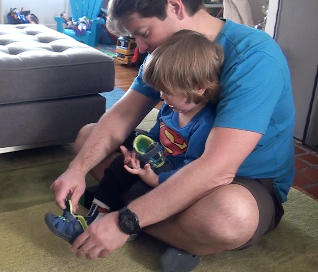
While some toddlers may be very affectionate, always in your lap and generous with the hugs and kisses, other toddlers pretend not to even know mom and dad. They are figuring out just how independent they are going to be. This can also vary from day to day. One day, you may have the most affectionate little person attached to your hip, and the next day they want nothing to do with you.
Try not to take offense, as this process of finding independence can be very confusing for your toddler. He may be testing the waters to see just how independent he can be before he needs to come running back for reassurance. Just remind him that you are always there, continue to set boundaries, and keep him safe. He cannot always express himself with words, but you can offer some words to help. Maybe ask him if he is afraid or if he feels brave. You can ask him if he is mad at you or sad about something. Even if his answer offends you, it is important that he be able to express himself.
Toddler crave consistency so keep the routines going. This will help her feel safe and secure. Even if your toddler is pushing you away, keep showing love and encouragement. A loving and secure attachment with a parent or caregiver provides toddlers with feelings of safety, comfort, and confidence to help self-esteem, trust, and even empathy and ability to make good choices later on.
References:
Zero to Three
Decety, J. (2010). The neurodevelopment of empathy in humans. Developmental Neuroscience, 32, 257–267.
Diamond, A. (2006). The early development of executive functions. In E. Bialystok & F. I. M. Craik (Eds.), Lifespan cognition: Mechanisms of change (pp. 70–95). New York, NY: Oxford University Press.
Lyons-Ruth, K., & Jacobvitz, D. (2008). Disruptions in attachment bonds: Implications for theory, research, and clinical inter- vention. In J. Cassidy & P. R. Shaver (Eds.), Handbook of attachment: Theory, research, and clinical applications (2nd ed., pp. 666–697). New York, NY: Guilford.
Meltzoff, A. N., & Kuhl, P. K. (2016). Exploring the infant social brain: What’s going on in there? ZERO TO THREE, 36(3), 2–9.

